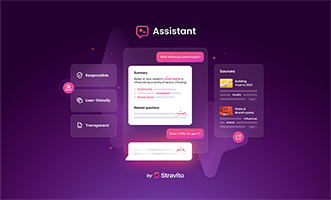Google is transforming its Search experience with generative AI overviews, planning and more

Google LLC said today that it’s integrating a host of new generative artificial intelligence capabilities within Google Search, in a bid to quell criticism that gen AI itself could reduce its dominance in the very lucrative service.
The new features are designed to reimagine the way people interact with its search engine, transforming it into a tool for research, planning, brainstorming and more. “We can take the work out of searching,” Liz Reid (pictured), vice president and head of search, told reporters in a briefing.
It’s no secret that Google is feeling somewhat threatened by the suggestion that generative AI chatbots might one day surpass Google Search as the go-to tool for people searching for information on the web. Google Search is, after all, the company’s main money-making machine, so it absolutely cannot afford to lose its crown.
Clearly, Google doesn’t think its traditional search engine has what it takes to beat the most advanced chatbots in many aspects of search, which is why it’s looking to add various generative AI capabilities directly to that platform.
At Google I/O 2024 today, the company announced a new Gemini AI model that’s customized for Google Search, combining advanced capabilities such as multi-step reasoning, planning and multimodality with its traditional search algorithms.
AI Overviews in Google Search
The headline feature is AI Overviews, which is intended to provide quick answers for when people don’t have the time to piece together all of the information they need. It provides a quick overview or summary of different topics, followed by a list of links that users can click on to learn more, if and when they have the time.
In a blog post, Liz Reid, head of Google Search, said AI Overviews has been up and running for some time already in Search Labs, which is a version of Google Search that integrates experimental features in preview, before they become widely available. Now, AI Overviews is being introduced to everyone in the U.S., ahead of a global rollout that will see the feature made available to more than 1 billion people by the end of the year.
With the launch of AI Overviews in Google Search, users who sign into the service with a Google account will be able to adjust the results it delivers, either to simplify the language it users or to break answers down into more detail. According to Reid, this will be especially useful to people who are searching a topic that’s new to them, or if they’re trying to simplify something so they can explain it to a child.
In the coming months, Google plans to expand AI Overviews’ multi-step reasoning capabilities to help answer more complex questions. This will enable users to ask more complex questions, with multiple nuances and caveats, in one search, rather than breaking down their questions into multiple searches.
As an example, Reid said someone might be looking for a new yoga or pilates studio that’s popular with locals, conveniently located near their home, and offers a discount for new members. AI Overviews will understand all of the nuances of this kind of multi-step request and provide detailed suggestions based on all of the user’s needs.
Reid said she’s excited by the rollout of AI Overviews because preview users have shown a tendency to visit a greater diversity of websites for help answering more complex questions. “We see that the links included in AI Overviews get more clicks than if the page had appeared as a traditional web listing for that query,” she said, seeming to hit back at critics who say AI search summaries could reduce valuable traffic to individual websites.
Making plans
Generative AI in Google Search can do much more than just summarize topics and understand more complex queries. It’s also supporting new planning capabilities within Search that essentially transforms it into a kind of assistant. At Google I/O, Reid demonstrated how Google Search can help to create a wide range of plans, such as meal plans, recipes, trip itineraries and more.
“Search for something like ‘create a 3-day meal plan for a group that’s easy to prepare,’ and you’ll get a starting point with a wide range of recipes from across the web,” Reid explained. “If you want to change anything, you can easily ask for whatever adjustments you need, like swapping dinner to a vegetarian dish. Just like that, Search will customize your meal plan. You’ll be able to quickly export your meal plan to Docs or Gmail.”
Reid said Google Search’s meal and trip planning capabilities are available now in Search Labs in English in the U.S. More plans will be added in the future, including categories such as parties, date nights and workouts.
AI-organized results
Google is also enhancing its search results pages by using generative AI to help users brainstorm when they enter certain kinds of queries. The results will be delivered via an “AI-organized” page that’s easier to explore than Search’s traditional layout.
According to Reid, users will see various helpful results categorized under AI-generated headlines, highlighting multiple perspectives and content types. This new capability will appear when users enter search queries that suggest they’re looking for inspiration, beginning with dining and recipe-related requests, and expanding later to movies, music, books, hotels, shopping and more. It’s launching first for English language searches in the U.S., and will come to other countries later.
Video search
Finally, Google said it’s enhancing search by letting users upload video footage of what’s around them, including objects in motion.
It effectively allows users to ask questions with video, Reid said, and can be especially effective when it comes to troubleshooting problems. If someone bought an antique record player at a thrift shop but is unable to get it working when set up at home, they can simply record a video that shows what the problem is, rather than trying to describe it in words. Google will then respond with an AI Overview page that highlights various steps and resources to fix the problem.
Search with video will launch in Search Labs in the U.S. with support for English language only, before expanding to support other regions and languages later.
“This is just a glimpse of how we’re reimagining Google Search — combining the very best of Search today with Gemini’s advanced capabilities,” Reid promised. “Soon, Google will do the searching, simplifying, researching, planning, brainstorming and so much more.”
Photo: Google
Your vote of support is important to us and it helps us keep the content FREE.
One click below supports our mission to provide free, deep, and relevant content.
Join our community on YouTube
Join the community that includes more than 15,000 #CubeAlumni experts, including Amazon.com CEO Andy Jassy, Dell Technologies founder and CEO Michael Dell, Intel CEO Pat Gelsinger, and many more luminaries and experts.
THANK YOU



